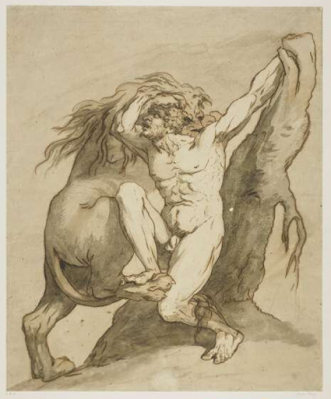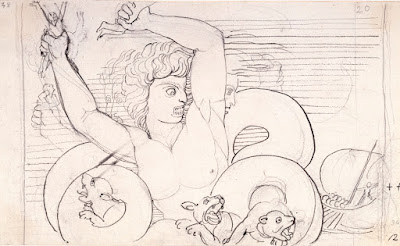 |
| Matthijs Bril Rome - Ruins of the Septizonium (at left) before 1583 drawing (structure demolished by Pope Sixtus V, 1588-89) Musée du Louvre |
 |
| Matthijs Bril Rome - Arch of Septimius Severus in the Forum before 1583 drawing Musée du Louvre |
 |
| attributed to Claude Lorrain Rome - Arch of Janus before 1682 drawing Musée du Louvre |
 |
| Charles Le Brun Figure of Mars ca. 1650 drawing (study for tapestry) Musée du Louvre |
 |
| Louis Chéron Hercules and the Nemean Lion ca. 1725 drawing (print study) British Museum |
 |
| Louis Chéron Hercules and the Stymphalian Birds ca. 1725 drawing (print study) British Museum |
 |
| François Lemoyne Figure of Bellona before 1737 drawing (print study) Musée du Louvre |
 |
| Hubert Robert Rome - Arcus Argentariorum (at left) and Arch of Janus ca. 1755-65 drawing Musée du Louvre |
 |
| attributed to Jean-Honoré Fragonard Rome - Study of Antique Fragments ca. 1760 drawing Musée du Louvre |
 |
| James Barry Milo of Croton devoured by a Lion ca. 1767-70 drawing British Museum |
 |
| attributed to William Hamilton Leander taking leave of Hero ca. 1790 drawing, with watercolor Yale Center for British Art |
 |
| John Flaxman Scylla (study for illustration to The Odyssey) 1792-93 drawing Royal Academy of Arts, London |
 |
| Henry Hugh Armstead Carved Acanthus-Leaf Ornament 1842 drawing Royal Academy of Arts, London |
 |
| Emmanuel Brune Study of Superimposed Orders ca. 1864 drawing Royal Academy of Arts, London |
 |
| Richard Phené Spiers Study of Doric Order from the Theatre of Marcellus, Rome ca. 1880-90 drawing Royal Academy of Arts, London |
 |
| Richard Phené Spiers Study of Corinthian Capital and Base from the Temple of Vespasian, Rome ca. 1880-90 drawing Royal Academy of Arts, London |
Philosopher Orders Crispy Pork
I love him so, this creature I do pray
was treated kindly. I will pay
as much as pig-lovers see fit
to guarantee him that. As for his fat,
I'd give up years yes years of my
own life for such
a gulpable semblable.
(My life! Such as it is! This
liberality of leaves! The world
won't need those seventeen more
poems, after all, there being
so few subjects to be treated. Three
if by subject we mean anyone
submitted to another's
will. Two if by subject we mean
topic. One if by death we wind up
meaning love. And none if a subject
must entail
the curlicue's indulgence of itself.)
– Heather McHugh (2008)